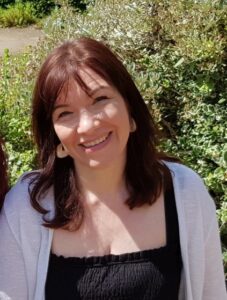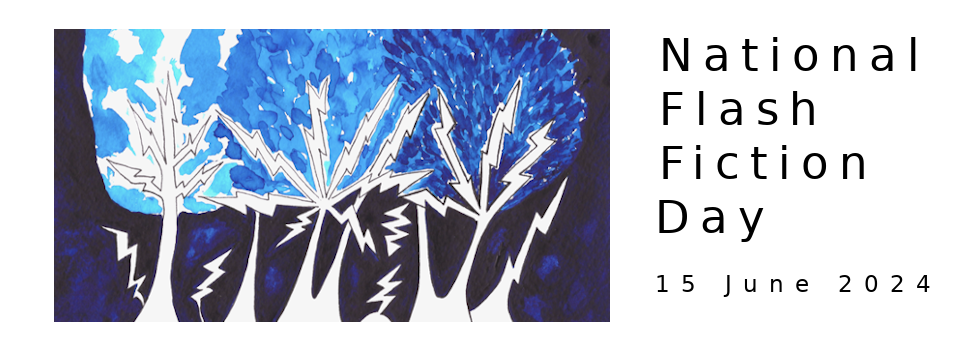Welcome to the third in our series of interviews with this year's National Flash Fiction Day Anthology editors and Microfiction Competition judges! Submissions for the Anthology and Microfiction Competition are open until 15 February 2023.
This week, Diane Simmons chats with Johanna Robinson, one of this year's Microfiction Competition judges, about novellas-in-flash, historical fiction and her advice for writers entering this year's competition....
 DS: Your novella-in-flash Homing was published by Ad Hoc Fiction in 2019 and shortlisted in the Saboteur Awards in 2020. Can you tell us a little about it?
DS: Your novella-in-flash Homing was published by Ad Hoc Fiction in 2019 and shortlisted in the Saboteur Awards in 2020. Can you tell us a little about it?
JR: Homing tells the story of a Norwegian family over five decades from before the Second World War to the 1970s. It focuses mainly on Caroline, the young daughter, but we see events from the perspectives of her mother and siblings too. The family live in a tiny coastal village that was razed to the ground by the Nazis because of the residents’ involvement in the Resistance. This part is true – the village, the destruction, and the rebuilding – although the family is fictional. The book also looks at identity, and where and how it’s possible to locate home once you have moved from where you grew up.
DS: You obviously enjoy writing historical fiction. Is there a period of history when you would like to have lived?
JR: I love historical fiction. What attracts me actually is local history, the ‘small’ events and patterns of a particular place and the people who lived there, which shaped the place it has evolved into – the DNA of landscape and architecture and how they impact those who come after. And none of these events are ‘small’ to the people involved, of course. I try to write without rose-tinted specs, so any period of history comes with its struggles and pain and often fear. To answer the question, perhaps the turn of the last century, before world war was on the horizon, and there was a sense of change.
DS: Writing a micro fiction of 100 words or fewer is no easy task. Do you have any advice for entrants to the competition.
JR: Even 100 words can stay with a reader, lodge in their mind. For me, two are Sharon Telfer’s ‘Gelsenkirchen: 10/10ths cloud, 30 aircraft lost’ and Gaynor Jones’ ‘Ogdens’. Look at the patterns in each of them – the steps that are both repetitive and yet move the story forward a gear. Can you combine this rhythm and movement? It goes without saying that each word needs to earn its place, both in its own right and in relation to those placed either side. Try moving words around, and play with structure. Read it again when you’re done. Is there an overriding emotion, and an underlying one?
DS: Have you always written fiction? If not, can you remember what inspired you to start?
JR: I read non-stop growing up, and loved writing stories. I got a typewriter for Christmas when I was about nine and wrote a story about the adventures of a big bouncing ball that escaped its owner. I was convinced I’d win the competition I entered. I didn’t and I’d sent my only copy! But it never, ever occurred to me that being a writer was a ‘thing’. There was a disconnect between the authors of the books I read and the fact someone, a person, had written them. I’m sad I didn’t pay more attention to the possibilities then, but there was no internet for community or research. I did start a book in about 2001, but no one ever saw it (though some of it actually made it into Homing). Then came work, socialising, children, retraining… So I started writing on a Comma Press short story course in 2016 in Liverpool. I can still remember the goosebumps of the first session!
DS: If you could sit down and have a chat with any three writers from history, who would they be?
JR: Published writers – Jane Austen, Mary Shelley, Mark Twain, because of the times and places they lived in as much as their books. But I’d also want people at the table who told inherited fireside stories or who wrote in their diary in the evening. The unpublished ones, often forgotten ones.
Johanna Robinson is based near Liverpool, UK, and has been writing short fiction since 2016. Her work has been featured in various magazines and anthologies, including SmokeLong, Reflex Press and Mslexia. In 2020, she won the TSS Cambridge Prize for Flash Fiction and the Bath Flash Fiction Award, and in 2019 Ad Hoc Fiction published her novella-in-flash Homing, which follows a Norwegian Resistance family in the Second World War. She is currently working on a novel set in Victorian Liverpool, and has been funded by Arts Council England. More of her work can be found at www.johanna-robinson.com.
